"The system is designed to make migrant women a sexual victim or a victim of labour exploitation"
- Nicole Ndongala ended up in Madrid a decade ago, fleeing the war in the Republic of Congo. He is currently the Director-General of the Caribou Association for the Reception of Migrants and a member of the advisory committee of the African House, among others. CEAR-Euskadi organizes in Bilbao the exhibition "Lives that cross borders. Leveraging his participation in the congress "A Feminist Analysis of the Southern Border," we've talked to him.

Why and how did you escape the Congo?
The civil war broke out and in 1997-98 the decision was made that many people would leave. Until then I was a happy girl, I had a normal life, but I had an uncertain future in front of me, and with the help of my family, I decided to leave the country, I was about 20 years old. You can't get a visa to travel outside Africa and I flew with a fake passport, from Congo to Belgium and from Belgium to Spain. The first days were days of uncertainty abroad, you feel helpless, drifting, because I came out young and only from my country and the destination society looks elsewhere; we are invisible to society. A few days later, thankfully, I met the Caribou Association in Madrid and the door of hope opened to me. The association helped me grow and move forward, without falling into victimization. Yes, loneliness, incommunication, nostalgia -- you don't take them off so easily.
"As a woman, we live an even harder migratory process than that of men; it is women who suffer the most blackmail and violence during the journey"
To care for the migrants who come now, what has the experience you lived in served?The experience as an illegal migrant (as we are told, illegal) helps me
to better understand what comes in the same situation, to have that look. To know what it is to be a migrant, you have to have those experiences, it's easier to detect the needs of the newcomer. Within the Caribbean, for example, I set up a women's training and promotion centre, because the African women we come here always come in that spirit of learning, but society does not open the door to us. If you don't have paper, you stay in the shade, you can't form, and those obstacles have been growing, we've gotten worse.
The idea is that, above all, men migrate from Africa.
We're only talking about African migrant women if we're pregnant or if we've arrived with a child. Those who come through human trafficking networks are invisible, they are anonymous journeys and they do not go to the media. Migratory processes are varied and, of course, women migrate too, but as you travel, you often do it in hiding.
Do we often see African women as victims of trafficking?
It's usually to belittle when it comes to talking about African women. They never mention, for example, women who have been on the front line fighting for equal rights, who have worked hard for coexistence... They represent us as if we were little cultural, as if we were not sufficiently prepared, they say that we are weak... A lot of topics. The prostitute has often been misled, but he is still a strong woman. I repeat: every migration is a different process, we cannot label all African women as victims. A high percentage of women are the basis of community in Africa, communities work on women's work.
It is curious to consider migrant women as weak when they have been able to make such a dangerous journey and duro.Es true that, as a woman, we still have to live a harder process of travel and migration, because we have more
walls than migrant men than we skip. Women are, for example, the ones who suffer the most blackmail and violence during the trip, sexual violence by the military, by the migrants themselves on the trip and in the camps… This is an undeniable reality, told us by the women who come here. That is why they often need the protection of men in clandestine footsteps, or they depend on the will of men, but not because they are weak women, but because they have no other choice. The woman who has a monthly fee, surely they won't let her out of the sea, because it's banned, because they say that the smell of blood draws sharks. If you want to get into the skate, the situations that women have to go through in order not to die are terrible. This stigmatization is not experienced by men.
Another example: the woman has been raped several times during the trip, she has become pregnant and when she reaches the southern border she has given birth [Morocco, Algeria…], the convoys will tell her that they do not accept the newborns because they make a lot of noise. This woman is condemned to stay there until the child collapses.
The abuses suffered by women are enormous, subjected to patriarchal and family traditions: forced marriages, genital mutilation... This overthrow reduces us as people, but also in these situations the strength and firmness that women acquire to move forward, to become masters of their lives is surprising. The decisions they take are sometimes easily judged by society, but one cannot speak of a situation without knowing the reason for it. In general terms, I would highlight one feature shared by African women: they are able to find solutions and they are going to get resources to move forward.
"We are the first to ask for an orderly migration, but an orderly migration is not to close borders, but to be able to travel safely"
Once migrated, they also have to face many prejudices. They often come in a state of shock, vulnerable, because they have had to cross three great walls: the discrimination they live in the country of origin, the sexualization and commodification of the journey, and the mere fact of finding obstacles
in the destination. With the lives of the people who live, it is harder for them to adapt them. Here the people we have for some time accompanied the newcomers, not only to basic care (a place, food, health care…), but also to training and legal advice. The key is to start from the needs they express, to help to respond to them, since the journey and the objectives of life of each of them are different and personal. Our foundation is active listening, because in this society we often don't listen to it, and it's fundamental to respect for personal autonomy. Migrants have a voice, but the host society sometimes forgets it, treats migrants as passive subjects, as if they didn't know what they want and what they want to achieve.
We also have a line of denunciation in the Caribbean, with the objective of making visible how the rights of migrants are violated. For example, we are talking about the barbarities that are being done in the ICN centres for migrants, which are worse than prisons. Or how European laws enforce institutional violence against migrants and, in particular, migrant women, because they create situations that go against our rights. The public institutions responsible for defending our rights do the opposite: they do not respect lives, they make them vulnerable. No one is illegal, no one should be illegal, and in the demonstrations we demand aloud regulation of our documentation and the possibility of working, but the legal and bureaucratic obstacles are enormous. We spend years and years until we legalize our situation.
So, the law you need to protect you, they condemn you to secrecy.
Because not having papers leaves us helpless, without rights, without job and social opportunities. In Europe, the system is designed to make migrant women a victim, a sexual victim, or a victim of labour exploitation. Moreover, it is those laws that threaten the lives of many children, women and men and condemn them to death on several occasions. The legalization of people is the only real alternative to ensure a dignified coexistence. And it's ourselves, the migrants, the first to ask for an orderly migration, because we suffer every time someone dies at sea. However, orderly migration does not always mean talking about closing borders, as they do, but rather looking for ways to communicate with countries of origin and to travel within the law. What is the question? That behind orderly or regulated migration, each government understands what it wants. What will an orderly migration look like if a person needs years and years to leave their country? Doing things right is an orderly migration, being able to travel safely.
"We should not fall into the dynamic 'put a black on your table'. What we have to work on is for migrants to have enough voice."
Are you afraid of the xenophobic discourse that is gaining strength in the mouths of many leaders?Migrant people are
not afraid of the xenophobic discourse, because it has always been there and has always been very present in our lives. Perhaps what is most surprising is the host society, because it is explicitly mentioned, because they do so freely and openly, even from the institutions. And that's worrying, yes, because speaking explicitly gives the extreme exclusionary discourse strength and strength. But let's be clear: this speech is not scary to us, because we know that migrating is a right, we are not asking for favors, and some extremists because they say this or that they are not going to stop us, we will continue to fight as we have done so far.
Several authorities distinguish between migrants who may come and those who cannot come. Do you think there are first- and second-graders?
We live on our skin: African migrants have been directly classified as economic migrants, although many have escaped the country because of war, violence, persecution… If they see you black, the tendency is to think you have traveled because of economic problems, they do not recognize you as a political refugee. In addition, it is so difficult to judge why a person has left their home, their country behind; behind every trip there is a story full of factors. Those who risk their lives at sea or in the desert seek peace, not only by will. And whatever the reason for migration, I would like to recall that the Universal Declaration of Human Rights states in its article first that all people are born free and equal in dignity and rights. I know it's pretty utopian, but that's not respected at all: it turns migrants into objects and classifies them.
In 2017 we interviewed Moha Gerehou, then President of SOS Racism in Madrid. He told us that in the conference on migration white experts take the floor and only invite migrants to expose their experience as victims. Is that still the case? The very
migratory experience we have experienced is of great value, but it is true that we can also talk about the reasons for migration and the solutions and keys to progress, and it is true that the host society does not take sufficient account of us. More and more we see migrants voicing in congresses, forums and social networks, but much remains to be done. Having said that, I would like to stress that we should not fall into the dynamic “put a black on your table” to give the image you have worked on cultural diversity. What we have to work on is for migrants to have enough voice and ability to convey what a whole group of people behind us want to hear.
In the case of migrant women, invisibility is even greater, but they are also fighting.
"Xenophobic discourse is not scary to us, because we know that migration is a right, they're not going to stop us."
The question is general, but how do you see Africa?
I too will reply to you in general. Africa is the continent of hope, despite the corrupt politicians in the West and Africa ruling in many countries and flouting their heritage and wealth. The suffering and poverty suffered by many Africans as a result of wars are still evident, but I trust the women and men of Africa. Africa wants peace. Remember, Africa is at the heart of mankind's reservation.
What relationship do you have with your hometown?
I have a lot of family members in Congo and I have relationships, because I will never lose my identity. I've been living in Spain for over 20 years, it's my second country, but I have a look at the Congo, because the people there need us. I would like to join my roots and pass old age in my country, but in the short term it is difficult to define my future.
.jpg)
Zutabe hau idazten nengoela, gaia aldatu behar izan dut, nire arreta osoa harrapatu dutelako Trumpen muga-zergek. Azalpen gutxi beharko duzue, leku guztietan da berria, Txinako produktuei %10eko zerga eta Kanadako eta Mexikoko produktuei %25eko muga-zergak jarri dizkie. Trumpek... [+]
To be honest, I don't know why I'm writing this. In today’s hostile environment, opinions of this kind are not well received. Perhaps LUZ will not publish this because it does not correspond to the opinions they have published so far (but if they have finally decided to publish... [+]
We Basques move our feet behind the witness of Korrika to proclaim that we want to survive as a Basque people in favor of our language, with the aim of the Basque Country we desire.
The tipi-tapa is the first step taken by a migrant person who leaves his homeland in Africa,... [+]
The poor management of the Valencian cold drop has led to a change in adverse meteorological alerts, as shown in the first season of "winter". Faced with the threat of rivers overflowing in Hego Euskal Herria, the indications for protection came along several paths, since no... [+]









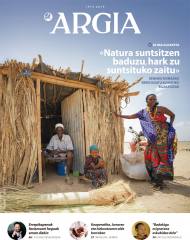




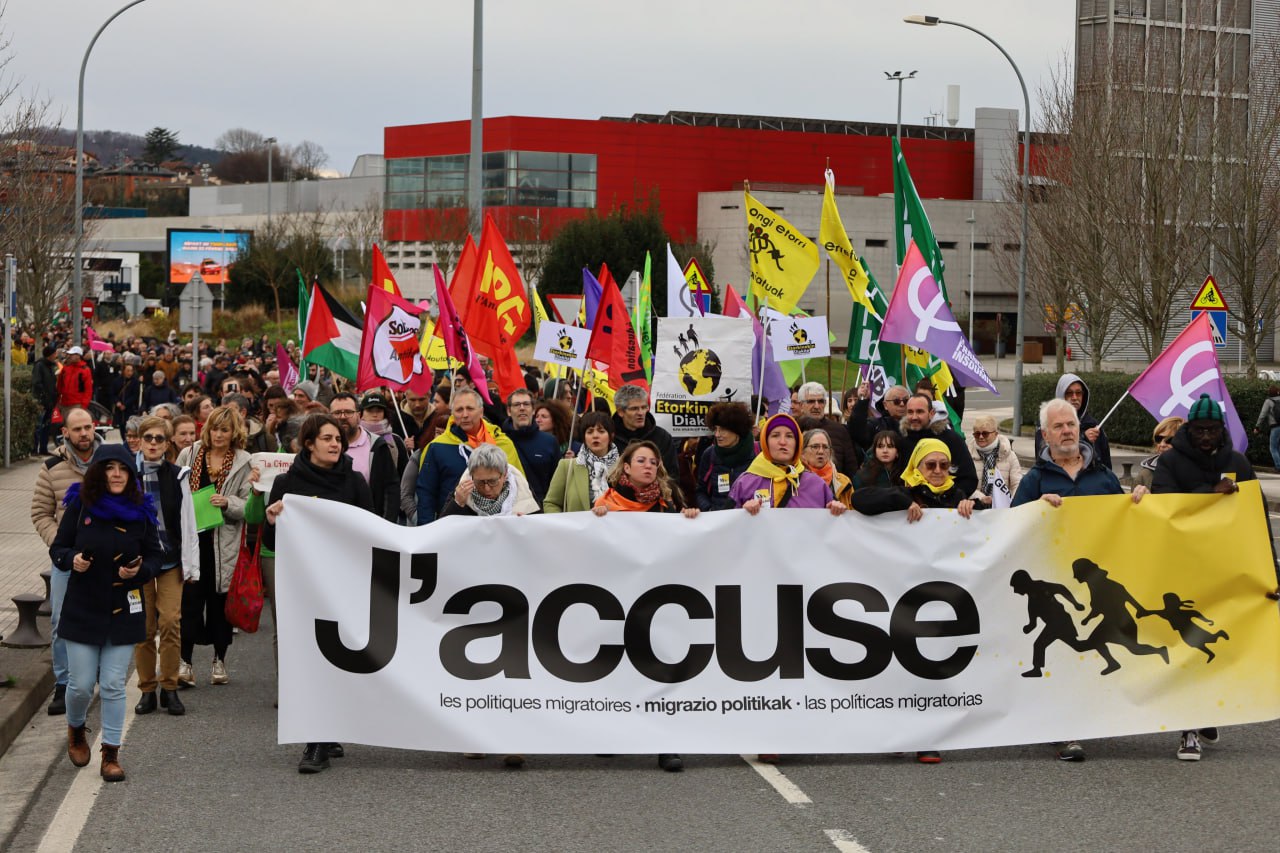

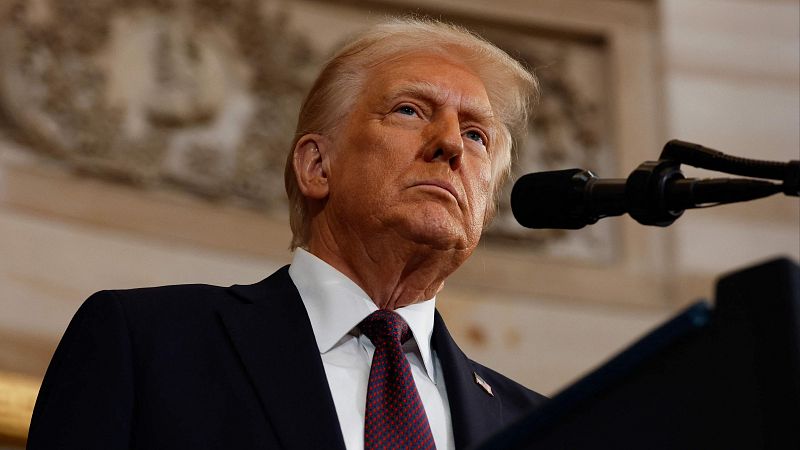
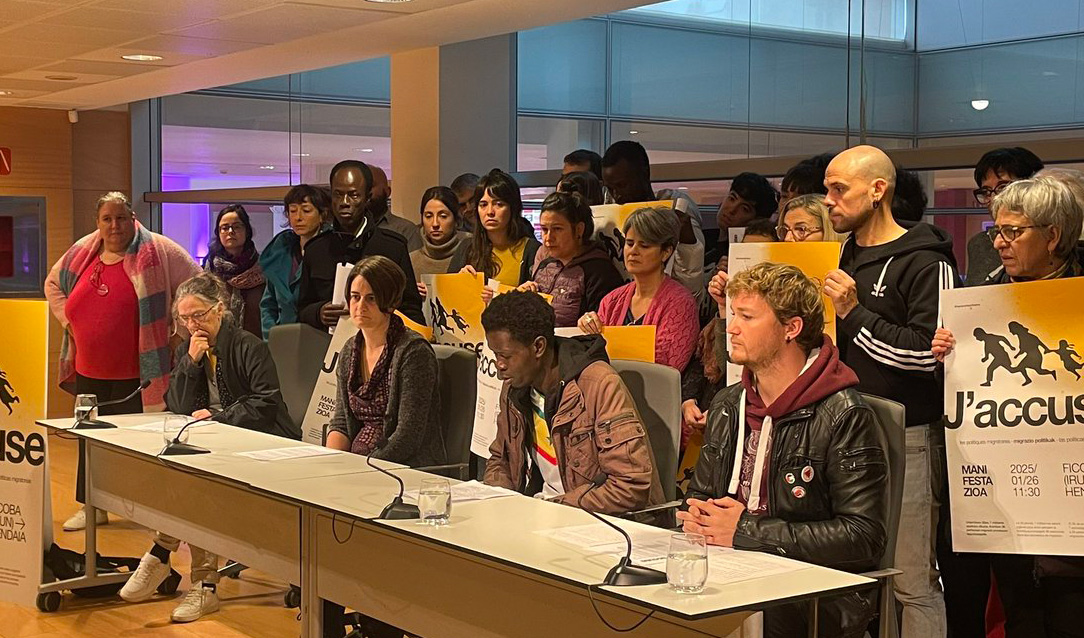

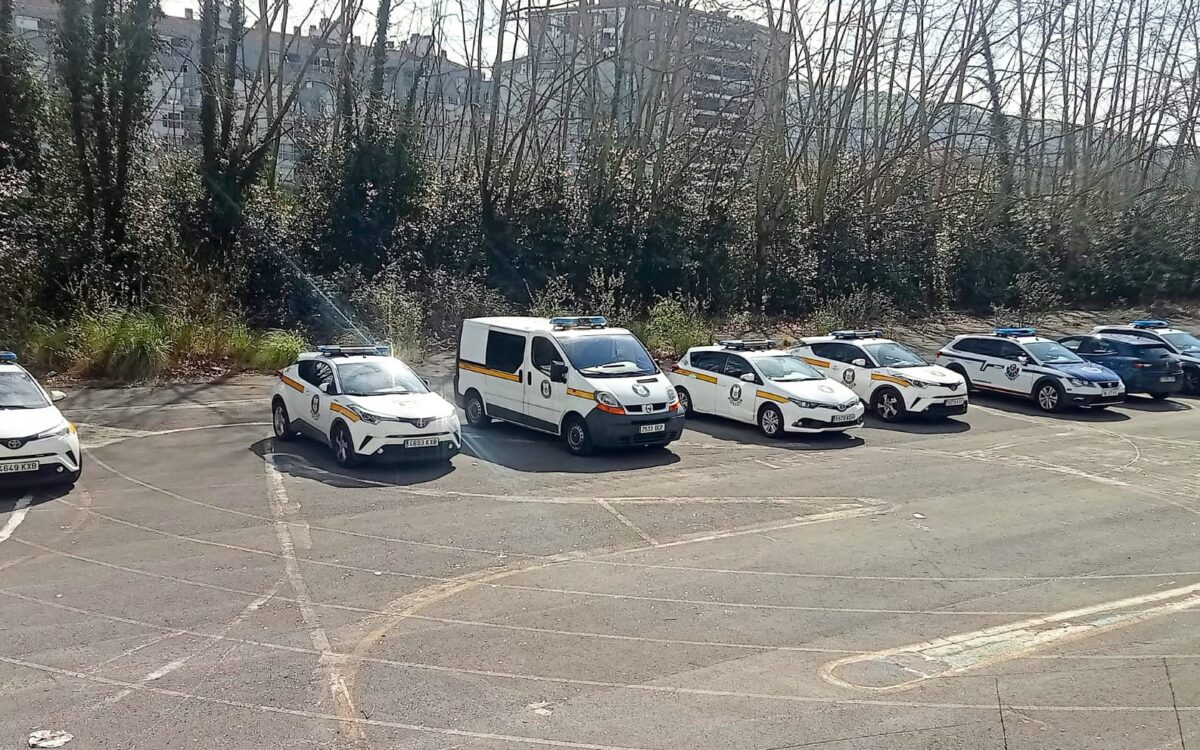
-(1).jpg)
.jpg)
